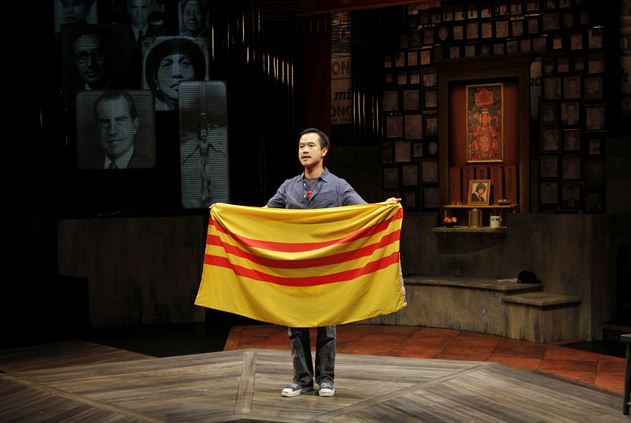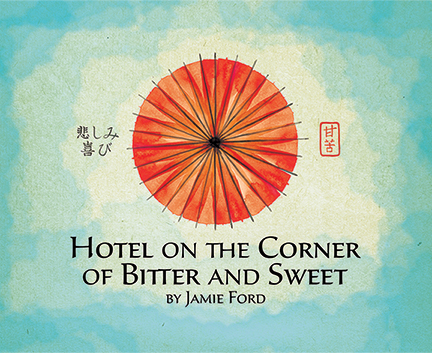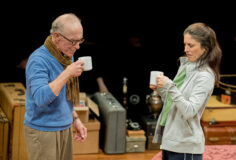Review: “Uncle Ho To Uncle Sam” by Trieu Tran and Robert Egan. Directed by Robert Egan. With Trieu Tran. Now through October 7, 2012 at ACT.

Trieu Tran in the World Premiere of his solo show, “Uncle Ho to Uncle Sam” at ACT.
Photo: Chris Bennion
Seattle has a large and vibrant Asian-American community so it’s both natural and welcome to see two new shows on area stages that relate the experiences, both good and not so good, of a group of people who DIDN’T come over on the Mayflower. It’s also very good news that both of these productions are expertly written, directed, acted and produced and both are shows you really shouldn’t miss. Also: you might learn something…and, be entertained while doing so.
First up, is ACT’s world premiere of “Uncle Ho to Uncle Sam”, the solo piece written by and starring Vietnamese-American actor, Trieu Tran that explores Mr. Tran’s very complicated relationship with his father and his amazing journey from the jungles of Vietnam to the frozen landscapes of Canada and eventually, the rough streets of Boston. “Uncle Ho” was co-written by the play’s director Robert Egan and the pair have created a dramatic and mesmerizing puzzle box of a play that travels back and forth in time to relate Mr. Tran’s journey and his Shakespearian relationship with a father that sometimes resembles the one between Hamlet and his ghostly padre. The play is a taut 90 minutes long and Mr. Tran commands the stage as he recreates painful and traumatic experiences from a life that began just as the Americans pulled out of Vietnam and eventually led to the actor’s terrifying escape from the country on a boat besieged by pirates and eventually ending up in Canada as a refugee. But, while many of the emotions in this play are horrifying and tragic, there are moments of tenderness and even humor and they are all expertly enacted by Mr. Tran as he channels not only his character, but the personalities of the other people in his life. It’s a masterful job of acting in a work with great resonance and power and all meticulously directed by Mr. Egan. It’s a superb collaboration, with expert design work by Carey Wong (sets), Rick Pederson (lights) and Brendan Patrick Hogan’s sound design and it’s highly recommended.
Review: “Hotel on the Corner of Bitter and Sweet” by Jamie Ford. Adapted and Directed by Annie Lareau. Produced by Book-It Repertory Theatre. With Jose Aboag, Stephanie Kim, Stan Asis, Stephen Sumida, Kathy Hsieh, Serin Ngai, Marcel Davis and Marianne Owen. Now through October 28, 2012 at The Center Theatre at Seattle Center.
Meanwhile, across town at the Seattle Center, Book-It Repertory Theatre is bringing to life a different Asian-American story, this one based on a novel by Jamie Ford, and primarily set in the city of Seattle. “Hotel on the Corner of Bitter and Sweet” focuses on life in Seattle’s International District during World War II, a time when Japanese-Americans were rounded up and put into internment camps for fear they posed a threat to national security. This shameful period of American history is a pivotal point of the novel and play, but the story centers on a Chinese-American man named Henry Lee and his relationship with his family and his community and how they interacted with the families living a few blocks away in Japantown. The story unfolds as an adult Henry confronts his past and his relationship with Keiko, a Japanese girl and the first and perhaps greatest love of his life when the two are youngsters during WWII. At heart, “Hotel” is a romance, and per the title of the play, a bittersweet one, but it doesn’t wallow in romantic conventions and manages to avoid being too sentimental or overly precious. It’s a sweet story but also one that deals with darker themes like racism and bigotry, and manages to do so with intelligence and integrity.
It also helps that “Hotel” is also a well-plotted yarn, and while I haven’t read the original novel by Jamie Ford, it seems apparent that Annie Lareau’s adaptation has managed the difficult task of translating a big, complicated book with many characters into a smart, streamlined two and a half hour show that never drags…and, she’s probably also aided by her concise work as the director of the play. Ms Laurea’s terrific work in both the adapting and directing departments is probably the key to the success of this show but she’s also aided by the simple but effective sets by Carey Wong, the lighting design by Andrew D. Smith, the sound work of Kevin Heard and Jocelyne Fowler’s fantastic period costumes. It’s a well mounted production in all regards.
“Hotel on the Corner of Bitter and Sweet” is also blessed with many of the finest Asian-American actors in Seattle (and, a few non-Asian actors as well) and the ensemble is uniformly excellent but the heart of the show belongs to Henry and Keiko, and Jose Aboag and Stephanie Kim are both superb playing characters that start out at the beginning of the show at age 12 and only age through their mid teens. The sweetness and charm of the couple are largely due to the strength of these two performances and both actors earned the ovations they received on opening night. They’re a couple you’ll remember for a long time.
And, quick shout outs to a some of the other cast stand outs, including Stephen Sumida as Henry’s gruff father; Kathy Hseih as his trying to understand mother; and Marcel Davis as Sheldon, the corner street musician who plays cupid to Henry and Keiko and introduces them to the world of jazz, a major thread throughout the play. And, an audience favorite was Marianne Owen as the gruff but essentially sweet Lunch Lady who also aids the lovers in their quest to be together. Ms Owen brought “Lunch Lady Realness” to the role.
Both “Hotel on the Corner of Bitter and Sweet” and “Uncle Ho to Uncle Sam” are highly recommended.


















